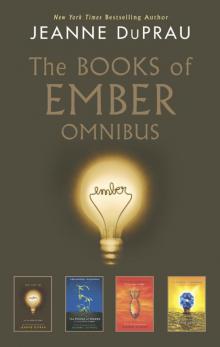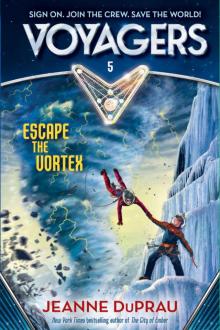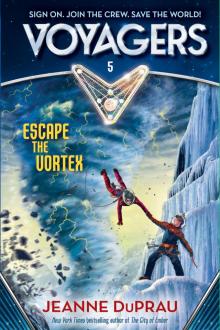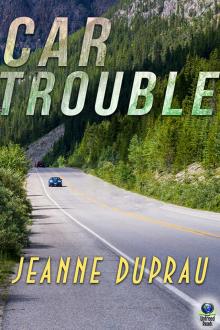- Home
- Jeanne DuPrau
Car Trouble Page 2
Car Trouble Read online
Page 2
Duff: Bad how?
Dad: Wrecks your eyesight.
Duff: My eyes are fine.
Dad: You need to get outside, play some basketball.
Duff: Why should I?
[Back to the top.]
And if—then situations showed up all the time:
IF cafeteria lunch = spinach surprise
THEN buy sandwich from machine
ELSE go to cafeteria
Duff didn’t see anything wrong with making his life into a computer program. Thinking of it that way made it seem more organized and manageable.
Around 9:30, somewhere in the green woodsy mountains close to West Virginia, just after he’d passed a road sign saying CHIPPER CROSSING, NEXT EXIT, the car started making a terrible noise. It was like the noise you hear when you drop a spoon down a garbage disposal: grunk-grunk-grunnkk, ratcha-ratcha-grunk. Duff whipped his foot off the accelerator. What was going on? The noise was so awful that he was afraid parts of the engine must be dropping onto the pavement and rolling away behind him. He veered into the slow lane, stepped hard on the brake, and came to a halt on the shoulder of the road. When the car stopped, the noise stopped, too.
Duff got out. He hoisted the hood and stared at the engine, a black and brown jumble of hot greasy metal, totally different from the clean, intricate innards of a computer, and—to him—way more mysterious. A smell rose from it that scorched the inside of his nose. Cars sped past on the highway, their drivers barely glancing at him, and the wind from their passing riffled the T-shirt he had bought especially for this trip, which said TWENTY TERAFLOP CAPABILITY across the front.
I hate cars, he thought. Stupid Stone Age technology. He gave the front bumper a furious kick, and the right half of it came loose and fell across his foot.
Phone Call #1
Wednesday, June 26, 9:37 AM
AAA recorded voice: You have reached Triple A Road Service. Your call may be monitored for quality assurance. To place a new road service call, press 1.
Duff presses 1.
AAA recorded voice: Please hold. Your call will be answered in the order it was received.
[Music—a sugary version of an ancient rock song]
Duff: Come on. Come on. Hurry up, hurry—
AAA real voice: Road service.
Duff: Oh, hi. My car has a problem.
AAA real voice: Your location?
Duff: Uh, 64. Just past the Chipper Crossing turnoff.
AAA real voice: And the problem?
Duff: Uh, engine noise. Pretty bad.
AAA real voice: Engine noise?
Duff: Yeah. And smell. Kind of a burning smell.
AAA real voice: Okeydoke. Be there in about thirty minutes.
Chapter 3
STUCK IN NOWHERE
The tow truck arrived after about forty-five minutes. A guy with curly red hair got out and peered at Duff’s engine. “Start her up for me,” he said.
Duff turned the key, and the terrible noise shook the whole car.
“Hmm,” said the tow truck man. “Sounds bad.”
He hooked Duff’s car to his tow truck, and the two of them drove off the highway to a gas station with a big garage in back. A man strolled out when he saw them coming. He was wearing an olive green shirt with DAVE written on the pocket flap in orange script. His face was creased with lines that looked strangely dark—probably, Duff thought, because engine grease had settled into them.
Dave raised the hood of Duff’s car and looked in. “Well,” he said after a while. “Looks to me like you have thrown a rod.”
“Is that serious?”
“Yes, it is.” Dave nodded slowly, looking quizzically at Duff, as if he’d never met anyone before who didn’t understand what “thrown a rod” meant. Then he pointed down into the depths of the engine. “See that hole there?”
Duff saw it—a ragged hole in a piece of metal. “That’s where that rod shot through your engine.”
“Oh, right,” said Duff, nodding as if he understood.
“How long will it take to fix?”
“Fix?” said Dave. “Well, you could order a new engine. Might take a week or so to get here. Might take a week to put it in. That’s two weeks total, if you’re lucky.” Dave smacked the car’s fender, which trembled. “Myself, I wouldn’t bother putting a new engine in this thing.”
Duff leaned over the engine and stared into it, rubbing his chin, trying to look as if he were inspecting the damage. His mind felt strangely blank and still, except for the words two weeks and wouldn’t bother, which hung in the blankness like neon signs. He waited for ideas. He drummed his fingers on the fender. He stalled for time.
“What do you think went wrong for this car to throw a rod?” he said.
Dave leaned against the passenger door and crossed his arms over his chest. “Did you maybe see the oil light flashing just before it happened?”
“No,” Duff said.
“Huh,” said Dave. “Don’t know how you could have missed it.”
With a sinking feeling, Duff realized that not having dashboard lights was more of a problem than he’d thought. He decided not to mention this.
“The point is,” said Dave patiently, “you didn’t get oil in there in time, and now your engine is shot.”
“I have to think about this,” said Duff. “Can I leave the car here for a while?”
“Sure.”
Duff fetched his laptop from the car and slung the strap of its carrying case over his shoulder. He set off down the road in what looked to be the direction of town. It was mortifying, being stuck on the first day of his journey. But he knew already what he wasn’t going to do: (1) call his parents to come and rescue him, (2) sit around for two weeks waiting for a new engine, (3) spend a big chunk of his money on a plane ticket to California. He had his heart set on driving across the country, and somehow he was going to do it.
When the job offer first came, he’d assumed he’d be flying to California. They wanted him to start the new job on July first, which was about three weeks away. But as soon as he accepted the job, a huge restlessness gripped him. Everything around him suddenly looked unbearably gray and dreary, his own house especially, with its musty old curtains that kept the living room in twilight, and the cracked linoleum in the kitchen, and the narrow hallway where he was always bumping into his father or his mother now that he’d gotten so big. He could hardly stand the thought of waiting three more weeks to get on a plane and fly away.
One night as he was roaming around on the Web, he came across a site called ScenicAmerica.com. As he looked at the pictures of the St. Louis arch and the Grand Canyon and Death Valley, thinking about how he’d never seen anyplace more distant than Ocean City, where his grandparents lived, and the inside of a hotel in Baltimore, where he’d gone that time for the computer conference, it suddenly occurred to him that all these famous American sights were on the way to California. Why fly twenty thousand feet above them and see them as dots when he could drive across the country and see them close up? Best of all: if he drove, he could leave right away. Well, almost right away, as soon as he could find himself a car.
He made up his mind to do it. And when Duff made up his mind about something, he threw himself into it. That’s how he’d always been, from the time he wrote an entire twenty-six-page novel about space aliens at the age of eight, to the time he discovered computers at the age of eleven. Now he threw himself into planning his trip. He traced his route on Internet road map sites, figuring out where he would stop each night. He set up a spreadsheet to budget his expenses. He made a list of all the sights he wanted to see on the way.
When he had his trip planned out, he printed the pages and put them in a binder with a label on the front that said merely TRIP. Actually, he thought of it as The Great Cross-Country Journey of Duffy Pringle, though he wasn’t going to write that where anyone could see it. He pictured this journey as a marker between his rotten old life and his wonderful new life. He would leave childhood beh
ind and arrive at adulthood (truly, because he’d be eighteen on the third of July), and on the way he’d see America.
*
What he was seeing of America right now, though, was not especially scenic. There was no sidewalk along the road toward town. Big rangy shrubs and weeds grew beside the gravel verge of the pavement, with various kinds of litter—flattened paper cups, straw wrappers, magazine pages—caught in their leaves. Farther on, he passed a two-story brick building whose sign said DOZE INN, VACANCY, and beyond that another road turned off to the left and became, after a short distance, a street lined with stores. This had to be downtown Chipper Crossing.
It looked to Duff like a place that hadn’t even caught up with the twentieth century, let alone the twenty-first. There was one intersection busy enough to have a stoplight, which swung on a low wire stretched across the street. Two cars and a bicycle were waiting for the green. Duff passed a department store window where boy and girl mannequins with smiling, grayish faces and little mitten-like hands modeled summer clothes. In a coffee shop, he saw a few people sitting at a row of stools at a counter. The smell of doughnuts drifted through the door. There was a dry cleaners, a variety store, a shoe store, a drugstore (that one breathed out a smell of cherry cough drops), but Duff saw no sign of what he was looking for—a place to connect his laptop to the Internet. He knew his wireless interface wouldn’t work—hot spots were only in cities, not in places like this.
He almost walked right past the Chipper Crossing Public Library. It didn’t look like a library. It looked like a dentist’s office, with a door that had a glass panel in its top half, printed with gold-edged letters. He was in luck. The library was open only three hours a day, and right now was one of them. They had to have a computer in there, didn’t they, with an Internet connection?
Inside was a room lined with bookshelves. A roundish woman with short, straight hair and rimless glasses sat at a desk at the far end, flanked by tall circular racks of paperbacks. She was the only person in the room. She looked up when he came in, gave him a smile, and went back to the book she was reading.
Duff looked around. He saw no computers. Behind the librarian was a wooden file cabinet with four brass-handled drawers labeled with letters of the alphabet. This was a bad sign.
“Excuse me,” he said to the librarian. “I need to connect to the Web.”
The librarian looked up. She smiled at him again, rather blankly, as if her mind were elsewhere, and closed her book, which was titled Murder at the Five and Dime. “The Web,” she said. “Oh, yes, the Web. Right! We don’t have that here.”
“The Web is everywhere,” said Duff.
“Well, but not here. Not yet! We’ll have it soon! But right now, only our main county branch is connected.”
“Where’s that?” Duff asked.
“Just over at Martinsville,” she said, pointing out the window.
“How far away is it?”
“Oh, twenty miles or so,” she said cheerfully. “It’s quite a lovely library. Anything else I could help you with? Any books you’re looking for?”
Yeah, thought Duff, how about The Complete Book of Car Engines and How Not to Wreck Them? But he only shook his head, said, “Thanks anyway,” and left.
He walked back down the other side of Main Street. The strap of his carrying case was digging a groove in his shoulder, and sweat was making his T-shirt stick to his back. He passed the coffee shop again. Warm, sugary smells were still wafting through the door, so he went in and bought a jelly doughnut to help him think. How was he going to solve this transportation problem if he couldn’t get on to the Internet? The Internet was his all-purpose problem solver. There was no one he could call on the telephone—the friends he knew best were email friends, and he didn’t even have their phone numbers. He could think of only one solution: he was going to have to find a motel room right now, even though it was only nine-thirty in the morning, and plug his laptop into a phone line. It was even possible that he’d need a motel room for sleeping in, if he couldn’t find a way to get out of here by nighttime.
So he trudged back to the motel he’d seen out at the edge of town—the Doze Inn. In the office, a sour-faced woman stood behind the counter. She wore a badge that said, WELCOME! I’M MRS. EDNA FOOTE. There was a smiley face on the badge, which must have made Mrs. Foote feel that she didn’t have to smile herself. Duff filled out a form, and Edna Foote handed over the key to room 26. She didn’t ask if he was old enough to rent a motel room. Duff didn’t expect she would. Something about his height, his slightly stooped posture, and his serious expression made people think he was older than he was.
Inside room 26, there was a large hard bed, a wooden desk, and a big painting on the wall of some cowboys riding over a grassy plain. Duff had never been in a motel room by himself before. It made him feel a little lonely. He opened the window and looked out at the view. Across the road were some scraggly trees, and beyond them was the highway, where cars and trucks roared past. The odor of exhaust floated up to him. He thought of all the rods in all those cars, doing whatever rods were supposed to do, and how for want of a few drops of oil those rods would run amok and shoot the engines to death. It seemed like a bad system.
And it wasn’t just cars that needed oil, but pretty much the whole country. People were constantly arguing about where the oil was going to come from. Should we suck it up out of some remote wilderness? Should we drill for it in the ocean? Other countries had plenty of oil down underneath their deserts, but we could only get at it if we stayed friends with them (even though they were sometimes run by dictators or harbored terrorists) or went to war with them. It seemed to Duff that the whole oil thing was a major pain in the neck.
He turned away from the window. All right, he told himself, focus on the problem. He took off his shoes and lay down on the bed to do some preliminary thinking. Clearly, he needed a new car. Just as clearly, he couldn’t afford to buy one. He had $200 in cash in his wallet—no, $150 now that he’d paid for the motel room—and $810 in a checking account that he could access with his bank card. Any decent car would cost more than he’d paid for this one, which would leave him without enough money: he not only had to buy gas and food for the trip, he had to have enough left for the first month’s rent on an apartment. He refused to call his parents for help. So what options did that leave? Take the bus to California? A depressing thought.
Duff took some deep breaths of the room’s stale air to get more oxygen into his blood and bicycle-pedaled his legs to get more blood flowing to his brain. Finally, after a period of blankness, one long-shot idea floated into his mind. It was worth a try.
He went to the desk, plugged his laptop into the telephone jack, and logged on to the Internet. He roamed about, checking message boards. It took him a while, but eventually he found this ad:
DRIVER WANTED
NEED SOMEONE TO DRIVE CAR
FROM LEXINGTON VA TO ST. LOUIS MO ASAP.
CARL H.
Duff rattled off an answer:
Carl—
I cd drive yr car to St. Louis. I’m in Chipper Crossing,
VA. Pls contact me ASAP.
Thx.
Duff Pringle
After that, there was nothing to do but wait. Duff occupied himself by Googling “internal combustion engine” and reading up on everything he should have known before. He hadn’t actually realized that explosions made cars go. Gas and spark coming together, blam blam blam, hundreds of times a minute! An engine was nothing but a kind of controlled bomb. No wonder it was likely to blow up.
After a while, when there was still no reply from Carl, Duff got too restless to sit around the motel room. He walked back down to the gas station, where Dave greeted him cheerfully and asked if he’d decided what to do. “I’m working on it,” Duff said. “I’ll have it figured out pretty soon.” His car was sitting off by itself with its hood up. Somehow it already looked like a piece of abandoned junk.
He walked back to the motel ver
y slowly, trying to give Carl plenty of time to find his message and answer it. Sure enough, a reply was waiting for him:
Great. Yr only 20 miles away. Who r u?
Duff wrote back:
On my way to CA to start job in Silicon Valley. Car broke down. Need wheels ASAP. Can u bring car here?
Right away, he got this answer:
OK!!!!!! Tell me where.
After three more exchanges, they’d agreed: Carl would have the car there by one o’clock. Duff would drive it to St. Louis, arriving some time that night. He’d get paid $50, on arrival, for his trouble.
Duff felt so good about this ingenious solution to his problem that he did a little power dance around the motel room, stamping his bare feet on the dust-colored carpet and punching his fists in the air. Who says he knows nothing but computers? Who says he can’t make it in the real world?
Chapter 4
THE GUY IN THE WILD SHIRT
It was only eleven o’clock. He had two hours before Carl came with the car. The first thing he did was walk back to the gas station and sell his dead Ford for $200 to Dave, who would use it for parts. That gave him $350 in his pocket in addition to the $810 in his checking account.
Another guy was at the station along with Dave this time—a young guy with long, stringy hair who was crouched down beside the wheel of a jacked-up car. He seemed to be working on the car, though he didn’t look much like a mechanic. He had on a wild shirt printed with tropical birds in blazing red, yellow, orange, and purple. He wore a little gold loop in one ear. He had on shorts that showed his pale, hairy legs, and on his feet were sandals with complicated black straps. Maybe that was his own car he was working on. Maybe he’d had a breakdown, too.
Duff went back to the motel room and took a brief nap, since he was probably going to be driving most of the night. When he woke up, he was hungry. The jelly doughnut had worn off. So he locked his door and headed toward downtown.
He walked with a springy step down the gravel shoulder of the road. Whenever he came to a smashed paper cup or a burger wrapper or someone’s old sock, he kicked it back under the bushes so the road wouldn’t look so trashy. He almost wished his father were with him, so he could tell him that his computer know-how had just solved a major real-life problem. His father was always saying he shouldn’t be so focused on one thing. “When you get out in the real world,” he said, “you’ll fall on your face. You gotta start thinking about something besides computers.”

 The Prophet of Yonwood
The Prophet of Yonwood The City of Ember
The City of Ember The Books of Ember Omnibus
The Books of Ember Omnibus The Diamond of Darkhold
The Diamond of Darkhold Voyagers: Escape the Vortex (Book 5)
Voyagers: Escape the Vortex (Book 5) The City of Ember Deluxe Edition
The City of Ember Deluxe Edition The People of Sparks: The Second Book of Ember (Books of Ember)
The People of Sparks: The Second Book of Ember (Books of Ember) The People of Sparks
The People of Sparks Escape the Vortex
Escape the Vortex Car Trouble
Car Trouble The City of Ember: The First Book of Ember
The City of Ember: The First Book of Ember